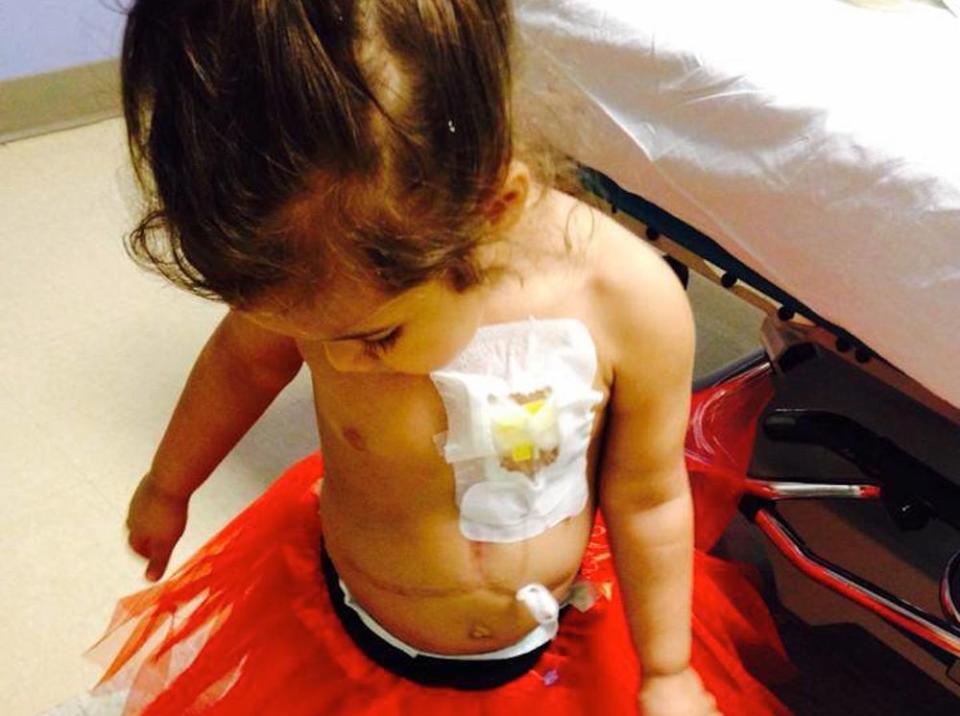Mom Is Tirelessly Raising Awareness About Her Daughter's Rare, Life-Threatening Disease

April 19, 2019
A brave mother named Brooke Ramirez has been facing a heart-wrenching, challenging battle ever since her daughter Trinity was born seven years ago. Ever since birth, Trinity has required almost round-the-clock care for what ultimately turned out to be diagnosed as progressive familial intrahepatic cholestasis (PFIC), an ultra-rare disease believed to affect only one in every 50,000-100,000 children worldwide.
According to the National Institutes of Health (NIH), PFIC causes progressive liver disease, which typically leads to liver failure. In people with PFIC, liver cells are less able to secrete a digestive fluid called bile. The buildup of bile in liver cells causes liver disease in affected individuals. One of the most severe characteristics of the disease is something called pruritus, or an intense itch, which can lead some children to self-mutilate to find relief, Ramirez notes.
"At about five months, I noticed Trinity would get bruises all over her body," Ramirez tells Parents.com. "These later grew in size and within a day or two, turned into huge hematomas. We took her to her local pediatrician who sent us to the emergency room at Anne Arundel Medical Center. That is when they noticed her clotting levels were through the roof. We were transported to Johns Hopkins Medical Center and a liver biopsy was eventually sent to Cincinnati Children’s Hospital. That is when we got the diagnosis of PFIC2. The process took about 1.5 - 2 months, and Trinity was about 7 months old at the time of diagnosis."
She says that when the doctor delivered the news of her daughter's diagnosis, she initially didn't believe him. "One of the largest characteristics of the disease is pruritus, or an intense debilitating itch," she explains. "Trinity didn't have that at the time, but about two months after her diagnosis she developed it almost overnight! She would scratch and cry constantly, and I felt useless to ease her suffering."
One method Ramirez tried was taking Trinity down to the basement, because the cool air helped. "Or we would dress her in a special onesies to prevent her from scratching," she says. "At the time, I was a young single mother who had little information on PFIC and did not know anyone else impacted by it. My only source of support was my mother, who helped care for Trinity while I worked. Trinity needed constant supervision to ensure she didn't scratch herself to the point of drawing blood. I am not sure how we got through it."
Ramirez notes that because there are only surgical options to treat the disease and no medications that can help, not even with the constant itch, Trinity had an ileum diversion surgery in August 2012, followed by internal biliary diversion in October 2012 to try and stop the itch. "Neither worked," Ramirez explains. "She then had a liver transplant in May 2013. My sister was the donor, and the trauma really brought my family closer together. We had to lean on each other for support."


Now, Ramirez is committed to raising awareness around PFIC and helping others understand how debilitating it can be for patients and their families. As part of her efforts, she has been documenting her family's journey on a Facebook page called Trin Raising Awareness for PFIC.
"By raising awareness, we can further help advocate for our children and encourage additional research that might one day help others find relief," she says.
Ramirez is hopeful that additional research can lead to a therapy that could help restore normal bile acid levels to people living with PFIC. "There are a few drug trials happening now focusing on itch relief, but nothing is approved for use at this time," she explains, noting that Albireo Pharmaceuticals is currently researching the disease and testing a drug candidate for patients with PFIC Types 1 and 2 called A4250, in a phase 3 randomized, controlled clinical trial at more than 40 treatment centers worldwide. (Trinity isn't involved in this trial.)
Better access to and earlier genetic testing can improve outcomes for patients, as well, notes Saul J. Karpen, MD, PhD, FAASLD, professor of pediatrics and Division Chief of Pediatric Gastroenterology, Hepatology and Nutrition at Emory University School of Medicine/Children’s Healthcare of Atlanta, Georgia. Dr. Karpen says that ideally, physicians and other care providers would recognize "that the child has a likely genetic disease and should get tested as early as possible."
He applauds parents like Ramirez "who continue to pursue answers and push for treatment options, for children who may have rare but serious liver diseases like PFIC."
To other parents who may be facing a PFIC diagnosis or similarly difficult health challenge with their little one, Ramirez says, "Stay strong and go with your instincts. The doctors were there to support me and help advise me when making medical decisions for Trinity, but they were not there at night when she was so uncomfortable from the intense itch that nothing could calm her. My mother's intuition helped me get through those tough times. When you're a mother to a child with a rare disease, it is your job to become their advocate. Do your research, stay calm, find a source of support, and never give up."
For more information, visit PFIC.org and Childrennetwork.org.


